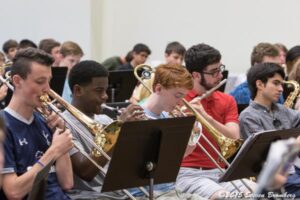This summer, I had the opportunity to spend time with some real titans in the music and journalism fields. I studied under the like of Andy Bechtel, a former editor of The News & Observer, and Dan Davis, a renowned jazz drummer who happens to teach at UNC. Here’s what I learned:

1. Jazz is so much more than just music.
Spending time dissecting the intricate patterns of each player on stage gave me a new appreciation for their complexities. The improvisational aspect is absolutely staggering.
Dan Davis describes a jazz band like a basketball game: each player has a preset list of rules (the key, the time signature, etc.) but is free to improvise. When someone takes a solo, they have the ball. They do what they want or need to do to further the quality of the whole team.
And it really is a team sport. Watching the musicians smile in excitement when one of their band members delivers an incredible solo is a touching thing to witness. In that moment, there’s a silent, heightened connection on the stage between the group. Being happy that the music is living through them, through their improvisation, through their work together… it’s a beautiful moment.
2. Reporting on music is difficult… really difficult.
I have a new appreciation of reporters who can synthesize a lengthy, complex performance like a concert or recital into a small, one-page report. While opinions are great, providing context for them can be a challenge. How do you qualify such a spiritual, in-the-moment experience like music through the page?
Andy Bechtel offers some great guidance here: He encouraged us to think of reporting as a conduit for the performer and the reader. Be active in your speech. If it’s a powerful experience, it needs powerful language.
Advice like this is worth taking into everyday life. It may sound odd, but we tend not to use the right type of speech to describe events. If you don’t use active, vibrant language in your description of something — a mountaintop from a hike, the eyes of your partner, a day spent catching up with an old friend — it won’t come across as beautiful as the moment really was. Something that important deserves beautiful language!
3. Interviewing musicians isn’t as scary as it sounds. Truthfully, it’s a lot of fun.
On the second day of our workshop, I was able to interview a piano student attending the workshop. To be frank, I was a little nervous to just walk up and request an interview with someone. When we managed to sit down and chat, though, it was fantastic.
His name is Sam Cifani, and I feel very grateful to have met him. He’s wildly talented and still in high school — he’s got big things ahead. Just getting to talk with him and get an idea of who he was is an opportunity I’m glad to have had.
4. Jazz history is really a tragically beautiful tale.
I can’t go into all of it right now, but I can hit some of the big takeaways:
Jazz is intertwined with America’s history of racist legislature and social dynamics. To draw on such powerful, painful history and synthesize this beautiful, free-flowing music from it is nothing short of a triumph of the human spirit.
It is, in essence, the transmutation of pain into something awe-inspiringly complex. This is not to say all jazz is about racism, but that was decidedly one of the key factors of its creation.
Some jazz makes you want to dance; some to cry. Some just makes you want to close your eyes and lose yourself in the improvised melodies. It’s a special thing, really, and I’m glad to have been given such an incredible experience over the course of UNC’s Summer Jazz Workshop.